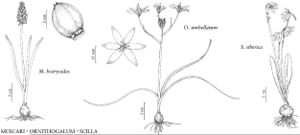Scilla siberica
Bot. Repos. 6: plate 365. 1804.
Common names: Siberian squill
IntroducedIllustrated
Synonyms: Othocallis siberica (Haworth) Speta
Revision as of 21:16, 5 November 2020 by imported>Volume Importer
Plants 10–20(–30) cm; bulbs tunicate, ovoid, 1.5–2 cm; tunics dark purplish brown. Leaves 2–4; blade broadly linear, 10–15 × 0.5–2 cm. Scapes 1–4. Inflorescences racemose, 1–2(–5)-flowered, bracteate; bract 1–2 mm. Flowers: perianth deep blue, 12–16 × 4–6 mm; pedicel drooping, 8–12 mm, equaling or shorter than perianth. Capsules 4–6 mm. Seeds pale brown, with long white appendage, globose, 2–3 mm. 2n = 12.
Phenology: Flowering early to mid spring.
Habitat: Escaping from gardens
Elevation: 0–1500 m
Distribution
Introduced; B.C., N.B., Ont., Que., Ill., Ind., Ky., Mass., Mich., Mo., N.J., N.Y., Ohio, Pa., Utah, Wis., Russia, north to 55º, Caucasia, and possibly n Iran, naturalized in c Europe.
Discussion
Naturalization of Scilla siberica is expected elsewhere.
Selected References
None.
Lower Taxa
None.
